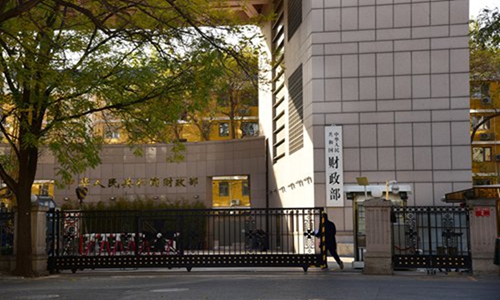
Ministry of Finance in Beijing Photo: VCG
The tough fiscal situation of China's local governments is expected to ease gradually as the nation's economy is rebounding, following a stream of supportive policies and measures to back the economy, a senior official said.
The rapid economic improvement and the low base last year due to the pandemic, plus the government's favorable tax policies will pave the way for a recovery in the growth of fiscal revenues this year, Minister of Finance Liu Kun said at a press conference on Wednesday.
"But we should also notice that the foundation of China's economic recovery is not yet solid, and there are many uncertainties with regard to fiscal revenues," Liu said.
From the perspective of government expenditures, budget increases in such areas as scientific and technological research, rural revitalization and environmental protection are necessary, and issues involving the basic livelihoods of people such as pensions, education and medical care also need to strengthened, while transfer payments are also necessary, the minister noted.
"Although the contradiction between fiscal revenue and expenditure is still prominent in 2023, we will not regress in terms of people's livelihoods," the minister said.
Last year, Chinese local governments had reduced revenues from land sales and taxation, while had rising expenditure on infrastructure and COVID-19 prevention, which caused a tight "budget situation". Local governments saw revenues decline 2.1 percent to about 10.88 trillion yuan ($1.58 trillion) in 2022, data from the Ministry of Finance showed.
The impact of declining revenues from land sale is controllable, Liu said, citing the linkage between income and expenditure. "When this income decreases, expenditures such as compensation for demolition will be cut, accordingly."
The debt level of local governments has aroused some concerns. Some localities do have relatively high debt risks and face huge pressure to repay principal and interest, and "we have urged them to effectively mitigate their debt risks," Liu said, adding that the ministry will hold firmly to the bottom line of "no systemic risk."
China's statutory debt ratio was about 50 percent last year, relatively low by world standards. Most of the government debt in recent years was in the form of special-purpose bonds for infrastructure.
When asked about the special-purpose bond level this year, Vice Minister of Finance Xu Hongcai said the quota will be announced during this year's two sessions, which will start during the coming weekend.
In 2022, China issued 4.76 trillion yuan of new local government bonds, a record high since local governments started to borrow on the open market in 2015, data from the Ministry of Finance showed.
Regarding where the proceeds from the special-purpose bonds will go, Xu said that in 2023, the focuses are on supporting the construction of projects in 11 specific fields, and the investment areas will be expanded in an appropriate way.
Global Times



